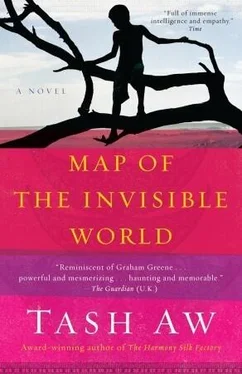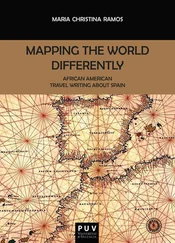Tash Aw - Map of the Invisible World
Здесь есть возможность читать онлайн «Tash Aw - Map of the Invisible World» — ознакомительный отрывок электронной книги совершенно бесплатно, а после прочтения отрывка купить полную версию. В некоторых случаях можно слушать аудио, скачать через торрент в формате fb2 и присутствует краткое содержание. Год выпуска: 2010, Издательство: Spiegel & Grau, Жанр: Современная проза, на английском языке. Описание произведения, (предисловие) а так же отзывы посетителей доступны на портале библиотеки ЛибКат.
- Название:Map of the Invisible World
- Автор:
- Издательство:Spiegel & Grau
- Жанр:
- Год:2010
- ISBN:нет данных
- Рейтинг книги:4 / 5. Голосов: 1
-
Избранное:Добавить в избранное
- Отзывы:
-
Ваша оценка:
- 80
- 1
- 2
- 3
- 4
- 5
Map of the Invisible World: краткое содержание, описание и аннотация
Предлагаем к чтению аннотацию, описание, краткое содержание или предисловие (зависит от того, что написал сам автор книги «Map of the Invisible World»). Если вы не нашли необходимую информацию о книге — напишите в комментариях, мы постараемся отыскать её.
comes an enthralling novel that evokes an exotic yet turbulent place and time—1960s Indonesia during President Sukarno’s drive to purge the country of its colonial past. A page-turning story,
follows the journeys of two brothers and an American woman who are indelibly marked by the past — and swept up in the tides of history.
Map of the Invisible World — читать онлайн ознакомительный отрывок
Ниже представлен текст книги, разбитый по страницам. Система сохранения места последней прочитанной страницы, позволяет с удобством читать онлайн бесплатно книгу «Map of the Invisible World», без необходимости каждый раз заново искать на чём Вы остановились. Поставьте закладку, и сможете в любой момент перейти на страницу, на которой закончили чтение.
Интервал:
Закладка:
“I have no family left in Sumatra and my Dutch was never very good,” he said at last.
Margaret stood up and made a cursory attempt to tidy her desk. “Hey, I’m sorry. I shouldn’t have said that. I don’t know why I’m so crabby these days. It’s just so frustrating.”
“What is?”
Margaret lifted her arms to gesture out the windows, but then just shrugged, sighing. “Everything. You know what I mean.”
Din nodded. “I think I do.”
Margaret turned away from him and looked out the window across the low sprawl of gray buildings. Everything looked gray to her now in Jakarta. The new, squat concrete shops, the flimsy wooden shanties, the six-lane highways, the dead water in the canals, the banners that were strung up everywhere across the city, whose whiteness dulled quickly from the dust and smoke and the exhaust fumes that choked the air. She did not know when she’d stopped noticing the colors and the details of Jakarta, or when this grayness had begun to form like cataracts that clouded her appreciation of the city. On the building across the concrete square hung painted banners that urged NO IMPERIALISM, CRUSH MALAYSIA or FRIENDSHIP TO AFRICA or EVER ONWARD NO RETREAT IN THE NAME OF ALLAH. She felt a sudden surge of irritation: Why was it that everything in this city was written in capital letters? Whenever she went to dinner at the Hotel Java the entire menu was in bold upper case, every item screaming its existence at her, insisting that she choose it and not something else, every dish jostling with its neighbor in a cacophony of advertisement. NORTH SUMATRAN FAVORITE FROM BANDUNG EVER POPULAR DISH OF TORAJA KINGS. As if this assault were not enough, the prices too were announced in oversize numbers, though it wasn’t clear to Margaret if this was an advertisement of how low they were or yet another mild form of extortion, the like of which Margaret experienced every day. Maybe she could no longer deal with the noise and the crowds and the bullying and the corruption, and had, therefore, stopped wanting to see the city in detail; maybe this was why she had begun to see everything in terms of grayness. She mulled over the possibility of this sometimes when she picked unenthusiastically at a TYPICAL EAST JAVA DELICACY in the lavish black marble surroundings of the Hotel Java. Was Margaret Bates becoming soft? In the end she decided that it was the city that had changed. Margaret Bates had not softened with age. And that was the problem, she knew that. Adaptation is the key to human existence, she used to tell her students. The Ability to Adapt: That was another of her strengths, along with her Resistance to Emotional Instability and her Reading of Moods. Yet here she was, frozen in time, waiting for the city to change back into something she recognized. It would not hap pen. She had known a different country, a gentler country, she thought. She hated that word, gentler —it was maudlin and sentimental; it reminded her of the way old white fools would talk about their plantations and their brown servants. Suddenly she hated herself. “I have to do something about this,” she said to herself, almost audibly, as she continued to look out the window at the dirty gray banners. I cannot go on like this. I must change, I must change.
“What did you say?” Din asked, folding his newspaper at last.
“Nothing,” Margaret said, turning around. She looked at Din’s clear, slightly watery eyes and felt guilty at having snapped at him earlier. She wished that she was able to think things through before saying them. “Let’s get an early dinner. Then we can go to the Hotel Java or somewhere fancy, you know, have some drinks — something strong and colorful with a little umbrella in it. We can watch all those ridiculous rich people with their prostitutes.”
Din pulled his chair closer to his desk and flipped open a notebook. “It’s too early for dinner,” he said, picking up a pen and removing its cap. He held the pen poised over the notepad but he did not write anything. “Besides, they won’t let me into the Hotel Java. Not like this, anyway.” He held the collar of his shirt between his thumb and forefinger for a second before letting it fall.
“I’m not taking no for an answer,” Margaret said. She grabbed his hand and pulled him toward the door. “You’re with me, no one will say anything. It’s one of those disgusting privileges of being white in a place like this. Everyone says they hate Westerners, but as soon as an orang putih walks into the room they give them whatever they want. Every other blanquito I know breaks the rules and behaves badly, and tonight I intend to partake in this disgusting orgy.”
They crossed the highway on the overhead walkway. Beneath them the never-ending traffic beeped and hooted and revved as usual, a river of bashed-up, rusting steel whose current flowed everywhere and nowhere. The sun had begun to calm slightly, hazy now behind the perpetual layer of cloud; the sky was a dirty yellow, a yellow over laid with gray, and soon, when the sun was setting, it would turn mouse-colored and finally — swiftly — black. There was never any blue, nothing true or clear.
They walked along the road for a while trying to hail a taxi, but there seemed to be none today so they settled for a becak , ridden by an ancient Javanese whose face was so fleshless that they could see the outlines of his skull under the old-leather skin. He rode with surprising speed and agility, passing men and women pushing their cartloads of peanuts and scrap newspaper and fruit. Stallholders along the road cried out to them as the rickshaw went past; they offered watches, toys, magazines, bottles of Benzine. Often Margaret thought they would collide with something — a horse-drawn cart or a bare-framed jeep or a bicycle — but at the last moment their driver would casually veer past the obstacle. Every few minutes they went past an accident or a broken-down vehicle. There were few cars, few recognizable ones, anyway. Everything had been cannibalized, picked to pieces and reassembled to look like something else so that it was impossible to identify a car as a Datsun or a Fiat or a Skoda. Something could begin as a Mercedes, morph mid-chassis into a Cadillac, and end up as an open-sided truck.
She looked across at Din, whose serious expression never seemed to alter very much. A more or less permanent frown drew his close-set, almond-shaped eyes even closer together and lent his slim features an air of mild anxiety. She liked him. He was certainly a great improvement over the last few who had filled his position; they had been, by and large, American postgraduate students earnestly pursuing dull projects on the Economics of Oil or International Aid in Newly Independent Asia. Without exception, they had been spectacularly unsuited to life in Southeast Asia. The longest serving of them had stayed for two years, the shortest a mere three months. There were rumors that they might not have been bona fide students, that they were in fact working for the U.S. government, but Margaret could not substantiate these rumors. She did find it slightly odd that there was such a steady stream of American students wanting to be teaching assistants in Jakarta, but there was nothing to suggest that they were funded by anything more sinister than indulgent Ivy League scholar ships. Once or twice she had casually slipped into conversation the presence of the CIA in Indonesia, which was an open secret in town, but she was met by blinking incomprehension, so she let the matter rest. In this city you could never be sure if anyone was who they said they were and, frankly, Margaret couldn’t care less.
Din, however, seemed far removed from the sordid details of Jakarta life. He did not have a comfortable scholarship to fall back on, and Margaret felt guilty because there was no money to pay him properly. In fact neither of them had drawn any salary for this month and although he never complained she knew that even his small rented room would soon begin to weigh heavily on his finances. He said he had taken a room in Kebayoran, but she did not believe him; it would be far too expensive for him. She knew that he did not want her to think him destitute, just another semi-slum dweller. He wanted her to believe that he was an ordinary middle-class professional, and she was happy to go along with it. But she did not know how long he could continue like this. She did not want him to leave.
Читать дальшеИнтервал:
Закладка:
Похожие книги на «Map of the Invisible World»
Представляем Вашему вниманию похожие книги на «Map of the Invisible World» списком для выбора. Мы отобрали схожую по названию и смыслу литературу в надежде предоставить читателям больше вариантов отыскать новые, интересные, ещё непрочитанные произведения.
Обсуждение, отзывы о книге «Map of the Invisible World» и просто собственные мнения читателей. Оставьте ваши комментарии, напишите, что Вы думаете о произведении, его смысле или главных героях. Укажите что конкретно понравилось, а что нет, и почему Вы так считаете.












